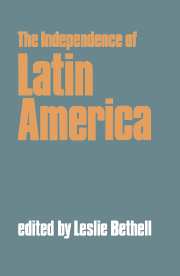Book contents
- Frontmatter
- Contents
- List of maps
- Preface
- 1 The origins of Spanish American Independence
- 2 The Independence of Mexico and Central America
- 3 The Independence of Spanish South America
- 4 The Independence of Brazil
- 5 International politics and Latin American Independence
- A note on the Church and the Independence of Latin America
- Bibliographical essays
- Index
4 - The Independence of Brazil
Published online by Cambridge University Press: 05 June 2012
- Frontmatter
- Contents
- List of maps
- Preface
- 1 The origins of Spanish American Independence
- 2 The Independence of Mexico and Central America
- 3 The Independence of Spanish South America
- 4 The Independence of Brazil
- 5 International politics and Latin American Independence
- A note on the Church and the Independence of Latin America
- Bibliographical essays
- Index
Summary
Portugal at the end of the eighteenth century was a small, economically backward, culturally isolated country on the edge of western Europe, with limited natural resources and only modest military and naval strength, but, at least on the face of it, with one great asset: a world-wide empire stretching across three continents which included the vast and potentially rich colony of Brazil. Portugal's overseas territories in Asia, Africa and America, and above all Brazil, were an important source of crown revenue; income over and above what was necessary to administer and maintain the empire was drawn from taxes on production, consumption and internal trade, from crown monopolies, from voluntary donations (some more voluntary than others) and from duties on imports and exports. Portugal maintained as far as possible a monopoly of trade within its empire and, as well as being the hubs of the trade in Portuguese goods, Lisbon and Oporto were the entrepôts for non-Portuguese goods exported to the colonies and colonial produce imported and re-exported to the rest of Europe. Brazilian re-exports in particular – in the late eighteenth century sugar and cotton, above all – were essential for Portugal's balance of trade. England was Portugal's principal trading partner, supplying Portugal – and indirectly Brazil – with manufactured goods (mainly textiles) in return for wine, olive oil – and Brazilian cotton. (During the first three-quarters of the eighteenth century Brazilian gold had also been a major item in Anglo-Portuguese trade, legal and illegal.)
- Type
- Chapter
- Information
- The Independence of Latin America , pp. 155 - 194Publisher: Cambridge University PressPrint publication year: 1987

